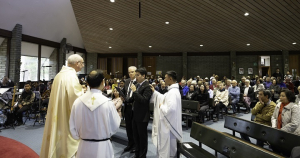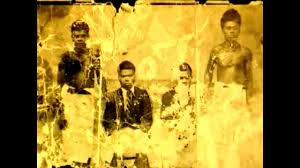Peter MALONE
Quoc Hoa Tran MSC, Final Vows, Blackburn.
Quoc Hoa Tran MSC, Final Vows, Blackburn.
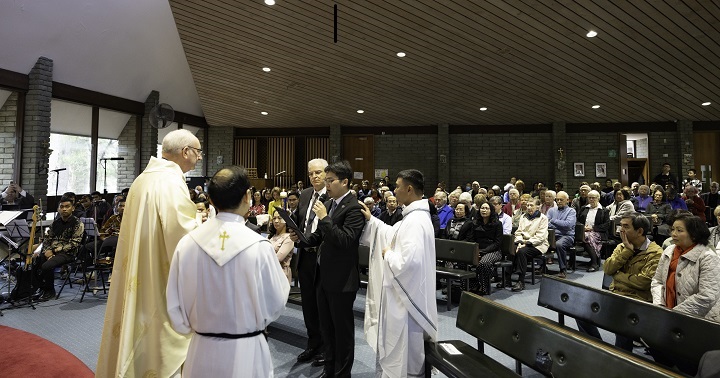
The MSC community celebrated Hoa’s profession of final vows on May 31st, the Feast of Our Lady of the Sacred Heart, in St Thomas’ parish Church, Blackburn.
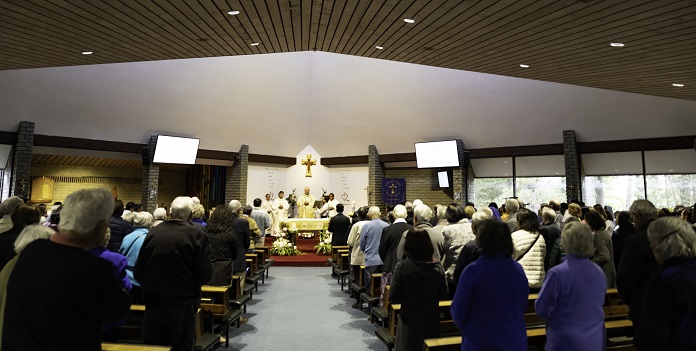
Hoa’s family were able to come to Australia to share in the celebration
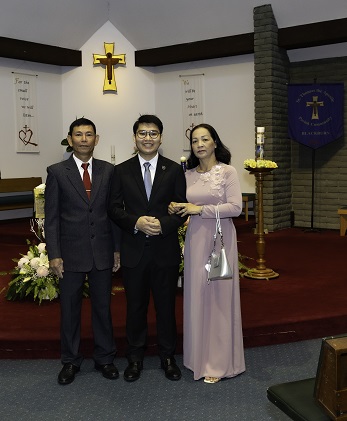
Provincial Superior, Stephen Hackett blesses Hoa

Hoa signing with witnesses Chris McPhee MSC and Thien MSC from Vietnam
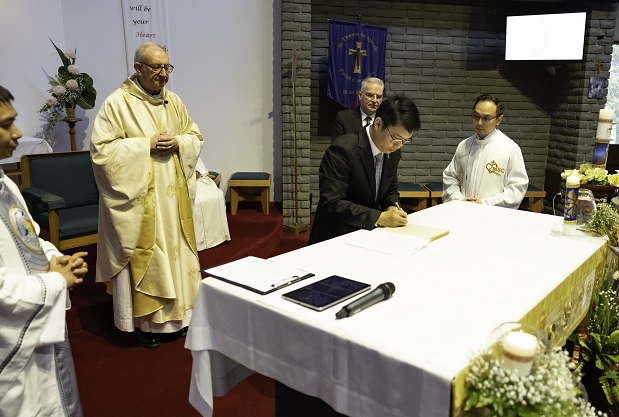
Stephen Hackett’s homily
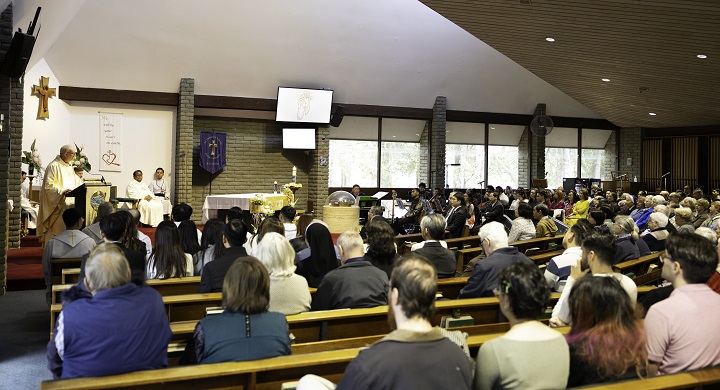
Concelebrants
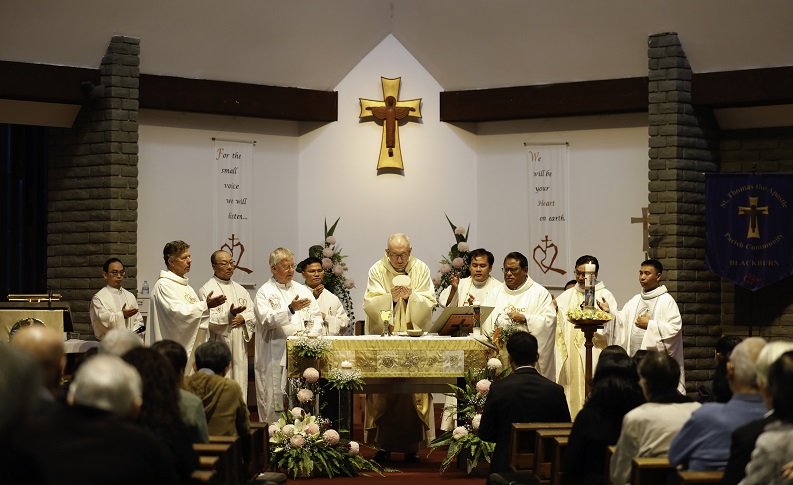
Hoa and his thanks
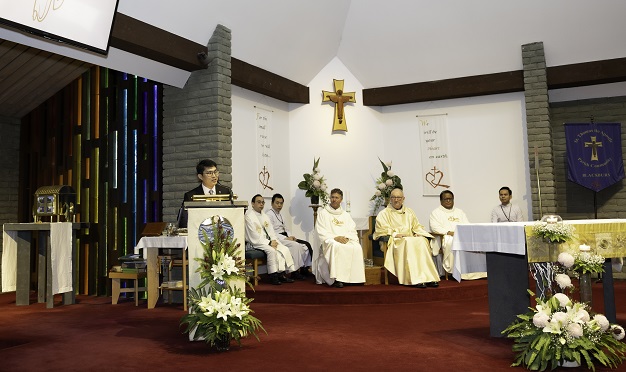
Photos of groups present
Trieu Nguyen MSC conducts the choir
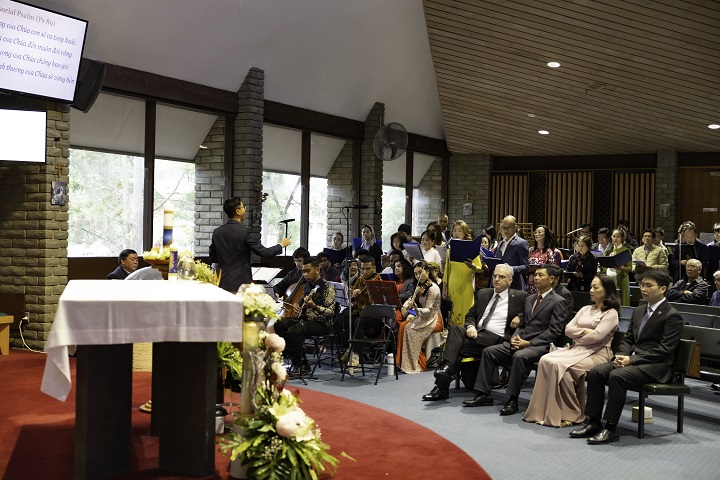
MSC present

Chevalier Family, OLSH, MSC, Lay
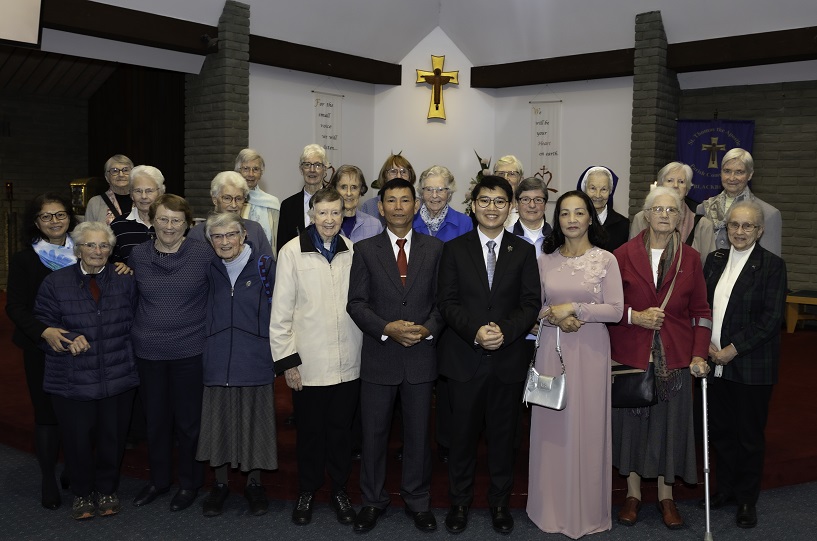
Choir and Vietnamese present, Indonesian visitors
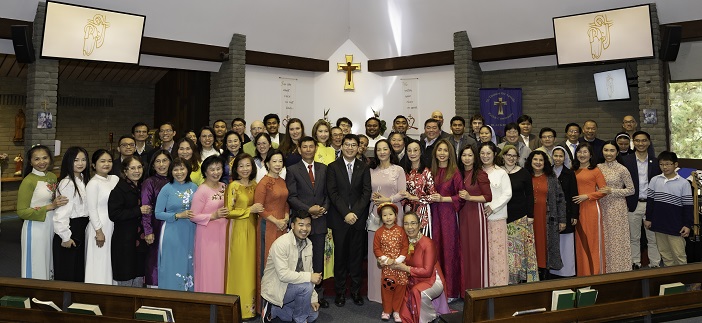
Members of St Thomas’ Parish
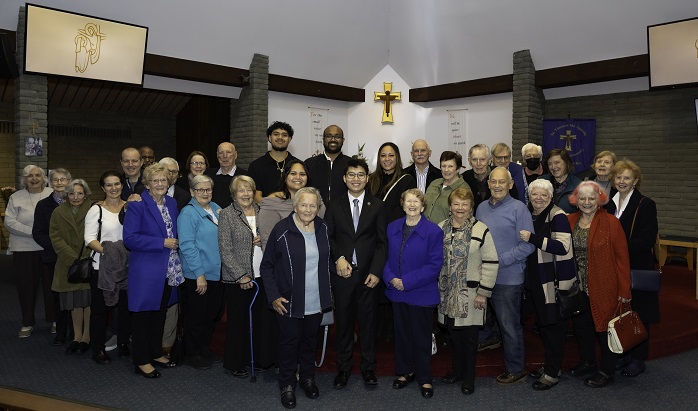
The whole gathering
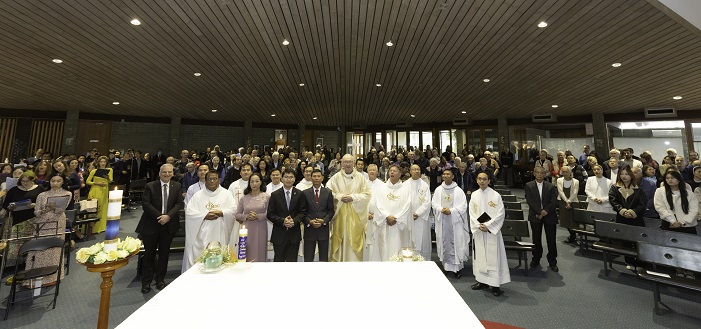
Armor/ Armored
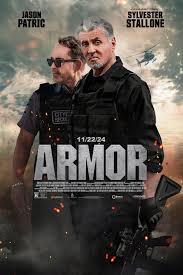
ARMOR/ARMORED
US, 2024, 89 minutes, Colour.
Jason Patric, Sylvester Stallone, Josh Wiggins, Dash Mihok.
Directed by Justin Routt.
Armor (original title, later Armored) is a security van robbery thriller. It received very bad reviews from the critics and not a great response from the public. However, it has found a life on Netflix streaming.
The setting, sometimes spectacular, is the border of Louisiana and Mississippi, the Mississippi River and a blocked bridge over it which serves as a dead end for the security van which is being pursued by cars with a team of thieves.
However, there is a family theme running throughout. Jason Patric is an alcoholic, former policeman, hyper-conscientious on duty, holding up a speeding car, then his own car, with wife and son, crashed into by a truck, the death of his wife. And he has become an alcoholic, organising meetings and urging members of the group to sobriety he still secretly drinks.
He has invited his son, Josh Wiggins, to work with him as a security guard. His wife is pregnant – and there is a family scene where father comes to dinner and there is some goodhearted and good-humoured banter.
In the meantime, there is a scene with a prisoner who is treated very leniently by guards, communicating with a government agent, and the arrangement of gold coins to be transported in the security van, with the connivance of the owner of the company.
There is family conversation on the drive, then the pursuit by the thieves. Sylvester Stallone, in a rather rare performance as a villain, is the leader. However, they are quite an erratic group, especially Dash Mihok doing a psychopathic turn. The two men in the van are determined to save the day, despite all kinds of gunfire attacks, teargas, the overturning of their vehicle.
While there is some madness and frantic wanting to attack in some of the group, Stallone’s character stays very calm, in control, not wanting to be a killer, eventually, after the overturning of the truck, its falling into the Mississippi, the two men escaping but being confronted by a psychopath, they are saved by Stallone.
There is some background to the gold coins that are being transported, contact with the prisoner, his being paroled, connection with the agent… Perhaps a possibility for a sequel which has not eventuated.
Innocent Prey
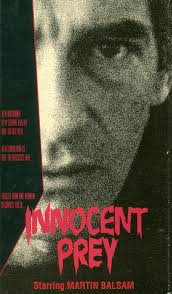
INNOCENT PREY
Australia, 1984, 80 minutes, Colour.
P.J. Soles, Kit Taylor, Greg Taylor, Martin Balsam, John Warnock, Richard Morgan.
Directed by Colin Eggleston.
A psychological thriller from the hero of so-called exploitation thrillers, the 1980s, especially a river range of films by producer, David Hannay. They were criticised as exploitation of the time – and time has not improved their reputation or the quality.
The co-writer director, Colin Eggleston, had a career in television and with films, especially Long Weekend. Filming for Innocent Prey took place both in Dallas and in Sydney. In those decades, American actors came out to perform in Australian films, here P.J.Souls who appeared in Carrie. And, in a surprising guest spot as a sheriff, Oscar-winner, Martin Balsam.
The first part of the film is in Texas, Cathy in a marriage with Joel, his alleged business interests, a meeting with some oily alleged businessman who threaten him, his then going to a motel, hiring a prostitute, and/-killing her. Cathy had taken her Australian friend to the airport, driving back had noticed her husband’s car, looked in the window and witnessed the killing. She goes home. He arrives, menaces her but she is saved because she has been in contact with her friend, the sheriff. The husband is arrested and imprisoned – but a violent escape, hiding his identity and making for Australia where Cathy has decided to move.
Another weird character in Sydney, a wealthy man who has set up cameras in a mansion he owns, spying on Cathy’s friend, then spying on Cathy when she arrives. But, he then makes himself known and ingratiates himself with Cathy. However, there is a divorced father who is a friend, with Cathy falling in love… And a nice family sequence.
Surprisingly, the slasher husband is peremptorily killed off while audiences may have been expecting quite a dramatic, melodramatic confrontation. But, then it is the turn of the eerie neighbour, a deadly confrontation with the divorced husband, and a melodramatic climax – with unnecessary detail of the husband having a razor.
The film was delayed for seven years in release. It is fairly unpersuasive decades later.
Karate Kid: Legends
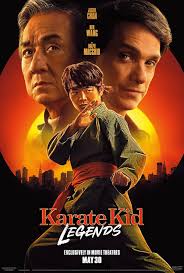
KARATE KID: LEGENDS
US/Canada, 2025, 93 minutes, Colour.
Jackie Chan, Ben Wang, Ralph Macchio, Joshua Jackson, Sadie Stanley, Ming-Na Wen, Wyatt Oleff, Aramis Knight.
Directed by John Entwhistle.
The popularity of the Karate Kid lives on. The original film, starring Ralph Macchio and Pat Morita, was released in 1984, a sequel in 1986, another in 1989, and a female version later with Hilary Swank. The films have had a large following – especially judging by the popularity of this film, 40 years later from the original, young audiences eager to see it.
And, they will enjoy it. And, so will all those parents who remember seeing the films on television, as well as the grandparents who remember the films so well from the 1980s!
And, the filmmakers wisely have a prologue here, a clip from the original, reminding audiences of Mr Miyagi and Daniel LaRusso. We, the audience, are immediately drawn into the atmosphere.
The first part of this film is set in Beijing, with Jackie Chan (now aged 70 with more than 150 film and television credits) running a kung fu Academy, a special student, Li Fong who has special talent and whose brother was killed by thugs, friends of a contestant he had beaten. Li’s mother is a doctor, forbidding her son to fight. Then, suddenly, she is transferring to work in a hospital in New York, taking her son with her.
The action in this film moves at quite a sprightly pace, keeping the attention of the modern young audience. And, while all the expected ingredients turn up, they are presented with verve, likeable characters, some humorous lines and situations that keep us smiling as well as involved. The filmmakers have certainly read the current sensibilities of young audiences very well and responded accordingly.
Ben Wang is a pleasing strong screen presence, audiences quickly identifying with him, some charm, some awkwardness, the tensions with his mother, caught up immediately with bullies, charming who Mia who works at her father’s pizzeria, he a former champion boxer and athlete. And, there is the immediate challenge from the arrogant (and, of course, to be ultimately defeated) Conor Day, asserting himself as Mia’s boyfriend.
Soon Mr Han, Jackie Chan, arrives in New York City, takes over the training of Li, especially for the 5 Boroughs annual competition. Mr Han has a great admiration for Mr Miyagi, photos, memorabilia. So, he immediately seeks out Daniel LaRusso trying to persuade him to come to New York to train Li. So, halfway through the film, here is Ralph Mackey again, in his early 60s, but still alert and active (and he is the star of the celebrated television streaming, Cobra Kai). Kung Fu and Karate, two branches, one tree!
In a way, we could write the screenplay ourselves at least in terms of the events. However, it is all presented in such a lively and engaging way, we want to see the expected events, we want to see how they turn out, the challenges, the difficulties, and, of course, the romance as well as mother’s relenting. And, we relish the defeat of the arrogant bully. It all happens and we are happy and satisfied.
Ben Wang is such an engaging screen personality he may well get the opportunity to be the Karate Kid again.
- The popularity of the original films, of Mr Miyagi, of Daniel? The sequels, television? Current audiences liking the films? A new opportunity?
- The plot of the original, the teachers, the students, karate, the skills, threats, competitions, achievement? Updated to the 2020s?
- The device of having the opening clip from the original film, the tribute to Pat Morita and Mr Miyagi, the reminder of Daniel and Ralph Macchio?
- The Beijing opening, Mr Han, Jackie Chan and his reputation, Kung Fu, the young students, Li behind the screen, his mother’s arrival? The background of his brother’s fight, victory, attacked and killed? The effect on Li and his grief, on his mother, her forbidding fighting?
- The transfer to New York City, farewell to Mr Han, settling in, the apartment, Li going to the pizzeria, meeting with Mia, her father, the attraction? His going to school, Alan as his coach, classes, study? The encounter with Mia and his helping her? The promise to see the city, on the back of the motorbike, breaking down, on the train, confronted by Conor Day and his associates? The background of his father, Mia’s father and the loan, the thugs and Li fighting them off, the hostility?
- Li, engaging personality, Mr Han’s arrival, the training, the Five Boroughs’ competition? His mother seeing the poster, forbidding him? His training nonetheless?
- Mia’s father, Li training him, techniques, boxing, his being knocked out, Li holding, remembering his brother, Mia urging him on, his failure, her upset with him, cutting him off? His seeing her with Conor Day? Upset?
- Mr Miyagi going to see Daniel, the meeting, the memories, Mr Miyagi? Daniel not wanting to come, Mr Han so persuasive, his arrival? Their working together, the training sequences, Kung Fu and Karate as two branches of the one tree?
- Readiness for the competition? The style, the posters on the screen, the bouts, the scores, the editing and pace? Li moving up the ranks? His rival moving up the ranks, the final, the confrontation?
- The humorous situation of the training for the particular somersault and kick, Li and his favours, going to the subway station, his training, eventually success, the trap for his rival?
- The final fight, Li losing, then catching up, the final equality, the trap and technique, victory? His rival as a bad loser, pushing the referee? His father’s anger? Li and the support of Mr Han, Daniel, Mia and her father? His rival finally accepting defeat and bowing?
- The happy ending, at the pizzeria, the special of full edges, Li working, the relationship with Mia, her vitality and charm? The future?
Extraordinary Journey of the Fakir, The
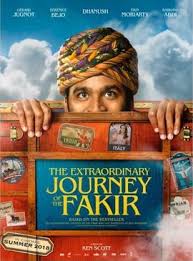
THE EXTRAORDINARY JOURNEY OF THE FAKIR
India, UK, 2018, 93 minutes, Colour.
Dhanush, Berenice Bejo, Erin Moriarty, Ben Miller, Gerard Jugnot, Barkhad Abdi.
Directed by Ken Scott.
An enjoyable mixture of Indian storytelling, comedy, song and dance, along with satire on the British, and dipping into French romance – with stops in Barcelona and Rome as well as a flight on a hot air balloon and landing on a ship in the Mediterranean.
Indian entertainer, Dhanush, is obviously enjoying himself, especially in telling his story to three 13-year-olds who are in danger of going into detention.
But, back to France There is a story of his being a youngster, mischievous, an absent French father, in the care of his mother. He also spent some weeks confined in a jail, a fellow prisoner, as in The Count of Monte Cristo, making contact and describing the outside world to him (and his later being moved by the story and writing it on a shirt while hiding as a stowaway on a plane). His ambition is to visit Paris and for his mother to go to Paris.
He is a street magician, gets the money, a valid passport and a fake bank note. Adventures in Paris, a roguish taxi driver, an encounter with a young American, some enjoyable scenes in a department store, reenacting home scenes with Mary, the American. While hiding in the store, his wardrobe is taken on a truck to England with refugees, an encounter with British officials, a satiric turn from Ben Miller, including an unexpected song and dance routine, friendship with the refugees from Africa, all finding themselves in Barcelona, then his escape in luggage to Rome, an encounter with a film star played by Berenice Bejo, good fortune, the balloon adventure, back to France, Mary with a new partner, his disappointment and his return to India. Yes, an extraordinary journey.
Of course, happy ending, his finding his feet in teaching, Mary returning, and his mother buried in Paris.
- The title and expectations? The Indian setting? The characters, Aja, young, growing up, adult, the various locations, Paris, London, Barcelona, Rome, the ship on the sea? The musical score, Indian style, songs?
- Aja as a magician, as a boy, with the other children, playing, mischief? His being put in the cell for three weeks, the contact with the blind man, his descriptions? Later writing his story on the shirt? His absent father, the letter, France? Is mother, hardships? Her wanting to go to Paris? His growing up, his journey?
- The framework of telling the story to the three boys, their age, his encouragement of them, their curiosity, response, avoiding jail, going to school every day?
- Aja and his character, getting the passport, the fake bank note? The plane, excitement of arrival in Paris, the taxi driver, taking advantage of him, his going to the Eiffel Tower, encounter with Mary, his questions, the exchange, the polite kiss? To meet again? In the store, the re-enactment of domestic sequences with the furniture? His hiding in the cupboard, its being taken, on the truck?
- The back of the truck, the refugees, their accepting him, the special friendship with Wiraj, destination England, passport control, running away, his magic on the policeman intrigued? Taken into custody, officer Smith, hardheaded, destroying his passport, assuming he was a refugee? The song and dance routine in the corridor? Being sent to Barcelona? The whole group?
- Barcelona, customs, the phone call to England? The whole group rounded up, the dormitory, his getting jobs, cleaning, the locked door? Finding it open, getting into the luggage?
- The flight to Rome, in the luggage, Nelly and her surprise, a style, actress? Confronting Aja at the hotel? His story, the shirt, reading the story, moved to tears? Her helping him with the money, selling it to her ex-husband? Her clashes with him? His giving the money, the encounter with the rival director, finding out the truth? At the club, the song and dance routines, the focus on him?
- The pursuit, the hot air balloon, the film director firing at him? Happy flying, no gas, landing on the boat, the captain and his case full of money, surrendering it?
- Back to France, the group, invading the ship, getting the money back?
- The balloon, the phone call for Mary, his learning that she had found a partner?
- Back in Paris, the taxi driver that he met initially, cheating him the first time, now taking his money, the escape? The encounter with Mary, with her partner?
- Meeting the refugees, his money, the interviews with each of them, giving practically all his money away, generosity and happiness?
- Mary, her girlfriend, the discussions about lesbians? The outings? Mary and her job, being promoted? The Eiffel Tower, Aja not turning up, the meeting with Peter, the bonding, the relationship? Meeting Aja? Her continued memories of Aja?
- His getting the money, returning to India, teaching, the classes, Mary’s arrival? The happy ending? And the encouragement of the boys?
October 8
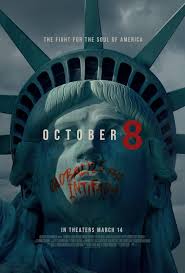
OCTOBER 8
US, 2025, 100 minutes, Colour.
Directed by Wendy Sachs.
The 1983 moviie, The Day After, focused on the aftermath of nuclear war. The title of this film, October 8, is also the day after, the Hamas attack on Israel, the massacre, the hostages.
The timeframe for this documentary is October 7 until October 2024. With the ongoing invasion of Gaza, the continuing role of Hamas in the peace negotiations, the numerous deaths in Gaza, especially women and children, the allowing and then the forbidding of food trucks, international diplomacy…, one of the interviewees actually mentioning this towards the end of the film, there is the challenge to the audience of 2025 and later, to look at the wider perspectives.
However, this film is particularly focused, written and directed by Wendy Sachs, one of the producers being prominent actress, Debra Messing, who introduces the film to the wide American audience and beyond. And the focus is on the consequent anti-Semitism in the United States, especially on prominent university campuses in the aftermath of October 7.
There is a wide range of talking heads for the documentary, especially Jewish students (from a range of ethnic backgrounds), political commentators, political representatives, many impassioned speeches.
As it should, the film highlights the horror of the Hamas attack, many clips included, the numbers killed, their ordinary backgrounds, the hostages taken. And, there are many photos of the hostages as well as some interviews with friends and relatives. During the film, there is no mention of the Israeli government, of the attack on Gaza, no mention of Benjamin Netanyahu and his supporters and his motivations, his political career as well as the eradication of Hamas. These issues will arise in any discussion about this documentary.
But, what is emphasised is the prevalence of anti-Semitism, memories of the establishment of the state of Israel, the treatment of Palestinians, the bases for some anti-Semitism. However, there are frightening sequences of public protests and demonstrations, vicious statements and, especially in these days of social media, brutal and hostile criminal threats.
The film also highlights the response of heads of universities in dealing with the demonstrations on the various campuses, including Cornell, Harvard, Santa Barbara. Some of the presidents of the universities are seen in Senate hearings, the critique being that they did not deal properly with the anti-Semitism and the violence. Some later resigned.
For Jewish audiences, the Zionist audiences, this is an important reminder of the experience of anti-Semitism, especially in the United States, during 2024. It raises images and memories of past anti-Semitism, especially by the Nazis and the Holocaust.
For non-Jewish audiences, it is a challenge, to check bases for opinions, to check how well informed we actually are about Israel, anti-Semitism, the role and fate of the Palestinians since 1948, the various uprisings.
In 2025, after the events shown in this documentary, the world, the United Nations, have had to face the increasing number of deaths, the number of world organisations and some countries accusations of genocide against the Netanyahu government, the images of death, injuries, destroyed buildings, hospitals, Palestinians continually on the move, the long prevention of entry of food trucks into Gaza in early 2025…
And the long delays in returning hostages and the bodies of hostages.
Not last words or images, but words and images that need to be reflected on, discussed with truth, honesty, reconciliation.
Great Lillian Hall, The
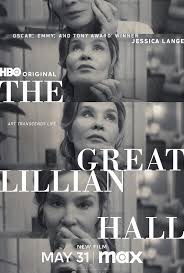
THE GREAT LILLIAN HALL
US, 2025, 110 minutes, Colour.
Jessica Lange, Kathy Bates, Lily Rabe, Jesse Williams, Pierce Brosnan, Michael Rose, Cindy Hogan, Keith Arthur Bolden.
Directed by Michael Christofer.
As we watch the central performance, we are probably thinking “The Great Jessica Lange”. For 40 years she has top lined in quite a range of strong films as well as television programs and has won two Oscars. She is perfect casting here.
The film has been directed by actor and writer, Michael Christoffer, Pulitzer and Tony award winner for his play, The Shadow Box. The screenplay is by Elisabeth Seldes Annacone, inspired by her actress aunt, Marian Seldes, who had the reputation, like Lillian, of never missing a performance.
This is a story of a Grande Dame, First Lady, of the Broadway theatre. In a collage during the opening credits, she is seen on stage in rehearsals for Chekhov’s The Cherry Orchard, intercut with many scenes of her daily life, using the same words, performances. Lillian Hall has been a significant name in Broadway lights for decades. But, a slip and a bump into a fellow-actor during rehearsal indicates some unease.
In fact, the great Lillian Hall is in the early stages of developing dementia. And, we realise, that with these slips, with some dramatic nightmares, with the frequent appearances of her deceased loving husband and her comfortable love for him and need for his presence, she is aware of the situation.
On the personal side, there is her long-time assistant, Edith (a feisty Kathy Bates) who discovers her medication and realises the truth. There is a visit from her daughter (Lily Rabe), reaching out to her mother, but her mother over the decades often emotionally remote from her daughter.
There is a visit to the doctor, clarity of diagnosis, medication, advice. But, as we expect, Lillian Hall is determined that the show must go on, that she will be in command of her memory, reciting her lines, accurate blocking of the performance on stage, communicating with her director. The central character of The Cherry Orchard often like Lillian Hall herself.
She does have some support from her sympathetic neighbour, Pierce Brosnan.
There are many scenes of rehearsal, of slips, of Lillian’s determination, of communication with her serious-minded director who places great hopes in her, hopes that are not shared by the dismal financial prospects for the producer should the show fail.
We may not have liked Lillian Hall very much if we encountered her in real life, nor she liking us. However, the film invites us to share in the dread of dementia, in the upsets that it causes, some hope when she does reach out to her daughter with a visit, and some plain speaking with Edith. But Edith does have one solution, for Lillian to be connected by microphone and Edith to be her prompter – and a sequence in the rehearsal indicating whether this could succeed or fail.
So, ultimately, the dramatic climax is the dress rehearsal, the cast ready, a substitute ready, the anxiety of the director, the impatience of the producer. And Lillian Hall, about to go to the theatre, experiencing another appearance of her husband, remembering his devotion to her, his directing her, his support.
And, even to the final moments, the audience continues to wonder if she will get to the theatre and, if so, could she actually maintain her presence of memory, could she make it through the performance, the eagerly anticipating audience arriving, including her daughter, or, the experience of her condition compelling her to face reality?
Of course, the ending, whether happy or sad, is well worth waiting for.
- Acclaim for Jessica Lange and her performance?
- The New York setting, the Broadway settings, the theatre, apartments, the New York streets, homes, restaurants? The musical score?
- The tradition of Broadway actresses, stars, first ladies? The image, the audiences, over many decades, the range of plays and performances, awards? The public lives, success? Their private lives, character, strengths and weaknesses, marriage, children, relationships, ups and downs? And the issue of ageing?
- The introduction to Lillian Hall, the opening sequences, in real life, encounters with people, the hotel doorman, friends and associates in the theatre, transferring some of those sequences in words to stage performance?
- The Chekov background, The Cherry Orchard, the central character, the screenplay drawing the parallels with Lillian Hall?
- The rehearsal sequences, the members of the cast, their characters, relating to Lillian Hall, the beginning of the difficulties, memory losses, staging and blocking? David, as director, his ambitions, dedicated to theatre, no family, working with Lillian, supporting her, understanding her, visiting her, and the visit to her daughter and family? The discussions with the producer, her hard-headedness, business issues, having the standby? The tensions behind the scenes?
- Lillian, Jessica Lange’s performance and presence, intensity, the thought behind her close-up sequences, inner intensity? Lillian, her age, reputation, her long career, directed by her husband, her devotion to him, his continued reappearance, her bond with him, wanting to be with him, the park, the park bench?
- Her forgetting her lines, her seeing her husband, the disturbances at night? Working with Edith, for 20 years, Edith and her personality, asked by Carson to look after Lillian, the sequences at home, arguments, telling Lillian off? Margaret’s visit, the quiche, the tension between mother and daughter?
- Margaret, her relationship with her mother, her marriage, her artist husband, her son? Visit to her mother, her mother turning up at the home, with David, the meal, the conversation, unable to tell her daughter the truth? The hospital sequence, the doctor telling Margaret the truth, her outburst against her mother, sense of alienation, her mother not disclosing her illness to her? Yet, the memories, her childhood, with the theatre, her parents, Lillian coming home, sitting on the bed, singing the song? And the older Lillian singing the song to her daughter? The finale, at the theatre, her mother acknowledging her daughter in the audience?
- The visit to the doctor, his talking the truth, the test, the memory, folding the paper and the hand trembling? The pills? The prospects, the symptoms, the decline, her having to expect dementia?
- Ty as her neighbour, the conversations, support and advice? His character, friendship, relationships?
- Edith, discovering the tablets, confronting Lillian, Edith frantic when Lillian visited Margaret? The plan, the earpiece for the prompting? The rehearsal? Lillian not turning up for the premiere, Edith frantic again, meeting her at the park bench, the argument, Lillian drawing on her energies, going to the theatre, the performance, Edith with the prompting, the audience, acclamation, the performance, wandering, yet the final achievement, the curtain call?
- The happy ending, Lillian and a final achievement, reconciliation with her daughter, with Edith, the success for the director and the producer?
- The film and the themes of dementia, in public figures, diagnosis, prognosis, acceptance and not, decisions how to behave, to relate? The need for letting go?
Canonisation Consistory, June 13th, including Peter To Rot.
Canonisation Consistory, June 13th, including Peter To Rot.

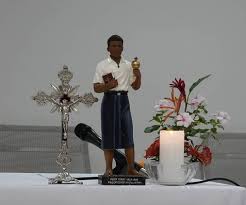

Chevalier Family Justice and Peace, First Friday reflection.
Chevalier Family Justice and Peace, First Friday reflection.

And living and dying for justice and peace, the feast of the martyrs of Quiche, June 4th

Roommate, The/ 2011
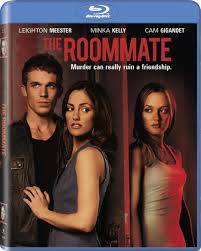
THE ROOMMATE
US, 2011, 98 minutes, Colour.
Leighton Meester, Minka Kelly, Cam Gigandet, Aly Michalka, Frances Fisher, Billy Zane, Nina Dobrev.
Directed by Christian E. Christensen.
The Roommate is a thriller, released in 2011, panned by critics, but very popular with audiences – and still circulating on Netflix 14 years later.
The film has a college setting, the central character, Sara, Minka Kelly, coming from interstate, meeting a group of friends at a club, Tracy, lively and outgoing, and Stephen, playing in the band. Tracy opens Sara to outgoing nightlife and enjoyment. She has a romantic relationship with Stephen.
Sara is waiting for her roommate. This is Rebecca, Leighton Meester, seemingly retiring, somewhat alienated from her parents (including Frances Fisher as her mother). She forms an attachment to Sara, becoming more and more preoccupied, being with Sara, learning more about her family.
While Rebecca does take Sara to see her parents, she is somewhat hostile to them.
What follows then is an attack on the various people in Sara’s life. There is a violent attack on Tracy in a shower. Stephen continues to protect Sara, defends her, is standard by Rebecca and taken to hospital. There is an art professor, played by Billy Zane, who is very sympathetic but then revealed to be flirtatious with a range of students. Rebecca has an interview with him, feigns a sexual attack by him which gets him dismissed. Sara also has an art friend, Irene, and goes to stay with her for safety, but Rebecca attacks and ties up Irene.
And, needless to say, there is a confrontation at the end, Sara saved, Stephen surviving, Rebecca doomed.
